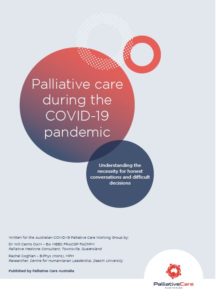Palliative care during the COVID-19 pandemic
 Palliative care during the COVID-19 pandemic: understanding the necessity for honest conversations and difficult decisions
Palliative care during the COVID-19 pandemic: understanding the necessity for honest conversations and difficult decisions
Over the course of the COVID-19 pandemic, Australian palliative care clinicians are facing the likelihood of significant challenges to the delivery, availability and quality of palliative care for existing palliative care patients, new palliative care patients with diseases other than COVID-19, and those who might die from COVID-19. One of the greatest concerns throughout this pandemic has been that a surge in demand for healthcare resources from patients with COVID-19 will overwhelm existing capacity and disrupt the care of people with other conditions, as has been seen in countries with high rates of COVID-19 infection. Given the uncertainties of COVID-19, it is vital that we prepare for the full range of possibilities for healthcare and health resources, including the worst-case scenarios of morally distressing decision-making in pandemic triage. Australia has not yet comprehensively addressed these issues nor produced the tools – guidelines, protocols and ethical justifications – necessary to support clinicians who would have to implement the unavoidable and heart-wrenching choices of resource allocation and triage.
This paper has been written to guide an understanding of the scope of challenges that a pandemic or disaster poses for the delivery of health services, in particular for palliative care. It describes the role of palliative care in supporting different patient journeys during COVID-19, including the importance of Advance Care Planning, the ethical challenges and distress that may arise in the event that resource allocation or rationing decisions become necessary, the overarching principles that govern the distribution of finite resources, and the practical realities of how such principles are implemented. It invites governments – Commonwealth, State and Territory – to take the lead in working with clinicians and communities through open and transparent processes to create the necessary guidelines for difficult decision-making during a disaster or pandemic. Finally, the paper discusses the role of governments in accepting legal and moral responsibility for guidelines that instruct the difficult binary choices of treatment refusal when resources cannot meet the demand for life-prolonging treatment during a major disaster or severe epidemic or pandemic such as COVID-19.
Written for the Australian COVID-19 Palliative Care Working Group by:
Dr Will Cairns OAM – BA MBBS FRACGP FAChPM
Palliative Medicine Consultant, Townsville, Queensland
Rachel Coghlan – B.Phys (Hons), MPH
Researcher, Centre for Humanitarian Leadership, Deakin University
Published by Palliative Care Australia
